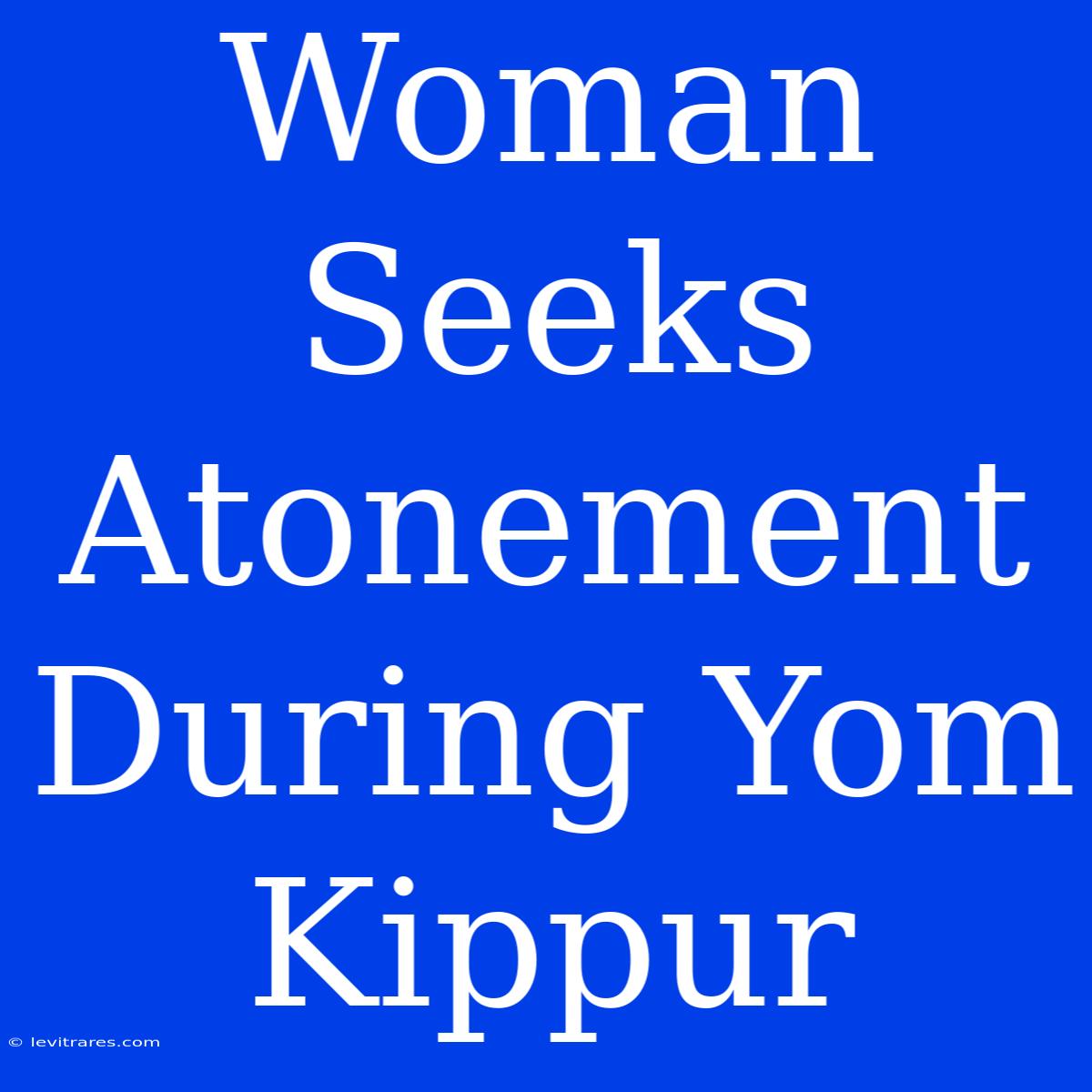Seeking Forgiveness: A Woman's Journey During Yom Kippur
What does it mean to truly seek atonement, and how does one find it during Yom Kippur? This solemn day holds immense significance for Jewish individuals seeking spiritual renewal, but for one woman, it represents a profound personal journey towards forgiveness and self-reflection.
*Editor Note: This article explores the spiritual depths and personal significance of Yom Kippur for individuals seeking atonement. As the holiest day in Judaism, Yom Kippur offers a unique opportunity for self-examination and reconciliation, highlighting the importance of sincere repentance and forgiveness.
Why is Yom Kippur a significant day for seeking atonement? Yom Kippur, also known as the Day of Atonement, is the holiest day in the Jewish calendar. It is a day of fasting, prayer, and introspection, dedicated to seeking forgiveness from God and from others for transgressions committed throughout the year. This annual ritual provides a powerful opportunity for individuals to confront their shortcomings, acknowledge their mistakes, and strive for spiritual renewal.
Analysis: To understand the profound experience of a woman seeking atonement during Yom Kippur, we delved into the spiritual significance of this day, exploring the rituals, practices, and historical context surrounding Yom Kippur. We analyzed the psychological aspects of repentance and forgiveness, examining how individuals can navigate their emotional journey towards healing and self-forgiveness.
Key Takeaways
| Aspect | Description |
|---|---|
| Fasting | The act of refraining from food and drink symbolizes self-denial and humility, allowing individuals to focus on their spiritual state. |
| Prayer | Intense prayer during Yom Kippur, both public and private, is a vital element, expressing sincere remorse for past mistakes and seeking forgiveness. |
| Repentance | Acknowledging wrongdoings and committing to change is central to the process of atonement, demonstrating a genuine desire for spiritual renewal. |
| Forgiveness | Seeking forgiveness from both God and individuals who have been wronged is a crucial aspect of Yom Kippur, promoting reconciliation and healing. |
The Journey of Atonement
The act of seeking atonement is not just a one-day event. It is a continuous journey that begins long before Yom Kippur arrives. This journey involves:
Self-Reflection: This involves looking inwards, examining one's actions, and identifying areas where regret and remorse exist.
Confession: Expressing sincere remorse to oneself and, if applicable, to the person who has been wronged, acknowledging the impact of one's actions.
Commitment to Change: This involves making a genuine effort to repair the harm caused, making amends, and committing to a different course of action moving forward.
The Power of Forgiveness
Forgiveness plays a pivotal role in the journey of atonement. Forgiving oneself and others is a powerful act of release, allowing individuals to break free from the chains of bitterness and resentment. It allows for emotional healing and paves the way for personal growth and spiritual renewal.
A Woman's Story
In the heart of Yom Kippur, as the sun sets and the evening prayers begin, a woman named Sarah sits in the synagogue, her heart heavy with the weight of past mistakes. She seeks atonement for a hurtful transgression, a moment of anger and judgment towards a loved one. She has spent weeks leading up to this day reflecting on her actions, acknowledging the pain she caused, and striving to understand the depth of her error. As she recites the Kol Nidre, a solemn prayer seeking forgiveness for past transgressions, she feels a wave of emotion wash over her. Sarah recognizes that forgiveness is a two-way street. While seeking forgiveness from God and from the person she wronged, she also needs to forgive herself for the choices she made. She recognizes that forgiveness is a process, a journey of self-compassion and understanding.
The Journey Continues
Yom Kippur may be a day of intense introspection and seeking atonement, but the true journey of repentance and forgiveness extends beyond this one day. As the days following Yom Kippur unfold, Sarah continues to reflect on her experience, carrying the lessons of self-awareness, compassion, and forgiveness into her everyday life. She strives to live with intention and kindness, seeking to build stronger, more meaningful relationships with others.
Conclusion
The journey towards atonement during Yom Kippur is not a destination, but rather a continuous process of spiritual growth. It is a journey that demands honesty, courage, and a willingness to embrace both the pain and the potential for healing. Through introspection, confession, and forgiveness, individuals can find solace and redemption, forging a path toward a more compassionate and meaningful existence.

